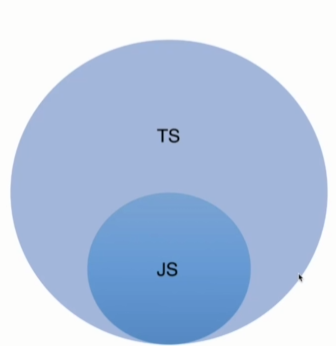Type Script
TS is actually a superset of js. It is used to solve some problems of js. It is an enhancement of the js language provided by Microsoft.

| TypeScript | JavaScript |
|---|---|
| As an enhancement to JS solving code complexity for large projects | Scripting language for creating dynamic web pages and writing some scripts |
| Strong typing, supports static and dynamic typing | dynamic weakly typed language |
| Errors can be found and corrected during compilation | Errors can only be found at runtime |
| Changing the data type of a variable is not allowed | Variables can be copied into different types |
What did ts bring to us?

TS base type
- boolean , number ,stirng
- enum
- any, unknown ,void
- never
- []
- tuple
var value : [数据类型]
enum f{
}
TS function type
- Definition: TS definition function requires input parameter type and output type
- Input parameters: Parameters support optional parameters and default parameters
- Output parameters: The output can be automatically inferred and defaults to void when there is no return value.
- Function overloading: The name is the same but the parameters are different. Multiple types can be supported through overloading.
function add(x:number[]) : number
function add(x:string[]): number
TS interface
- Definition: Interface is used to define object types
- Features
- You can select attributes:?
- Read-only attribute: readonly
- Can describe function types
- Can describe custom properties
- Interfaces can be very flexible
- If necessary, you can also use key string to set attributes.
interface Person{
name : string
age: number
}
const p1 : Person{
name: 'lin',
age:18
}
p1.name
p1.age
// key string
interface RandomKey{
[propName:string]:string
}
cosnt obj : RandomKey{
a:"hello",
b:"world"
}
TS Class
- TS supports es6's class keyword writing method which is similar to that of js
- Features:
- Added modifier public private (private) protected (can only be used by subclasses)
- Abstract class:
- Can only be inherited and cannot be instantiated
- As a base class, abstract methods must be implemented by subclasses
- The interface constraint class uses the implements keyword
class a {
public name : string
}
class b extends a{
}
TS advanced advanced type
- Union type | can have multiple attributes
- Intersection types & can mix properties into objects
- Type assertions can eliminate the need for related type inference
- The difference between type alias type and interface is
- Interface is the object defined by js
- type is convenient and practical for defining aliases
- type can define basic types but will not mix them
- Type and interface have similar functions and may be confused
- Generally speaking, interface is used when it comes to classes and mixed attributes. For functions and others, you can follow your habits.
let num number|string
num = 8
num = "eight"
interface p {
name:string
}
type stu = P &(grade:number)
const student :stu
student.name
student.grade
function getlist(arg:number|string): number{
const str = arg as string
}
TS generic
The definition of generics needs to consider flexibility and reusability
- The syntax of generics is <>. Writing type parameters is generally represented by T.
- There are two designated types when used:
- Define the type to use
- Determine the automatic derivation type through ts
- The role of generics is temporary, deduced through the passed type
function print <T>(arg:T):T{
return arg
}
Generic tool type
- typeof: Get the type
- keyof: Get the used key
- in: Traverse enumeration types
- T[k]: Index distribution is stable
- extends generic constraints
interface p{
name:string
age:number
}
type k1 = keyof p //'name'|'age'
TS actual combat
- declare third-party library requires type declaration file
- .TS file definition
- @types third-party library type package
- tsconfig.json defines the configuration of TS
Backend interface type constraints
import axios from 'axios'
interface API{
'book/detail':{
id:number
},
'/book/comment':{
id:number,
comment:string
}
}
function request<T extends keyof API >(url:T,obj:API[T]){
return axios.post(url,obj)
}
request( '/book/comment',{
id:1,
comment:"good!"
})